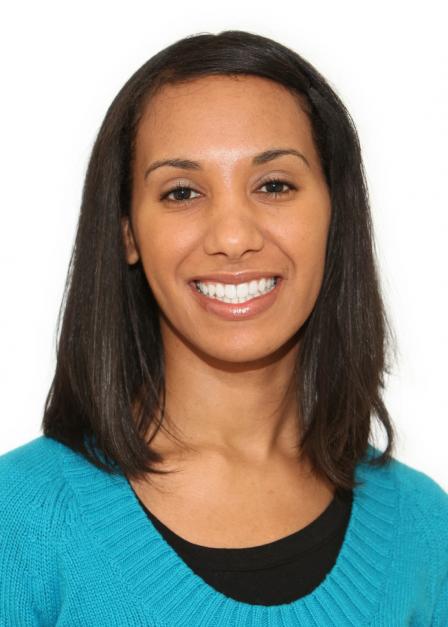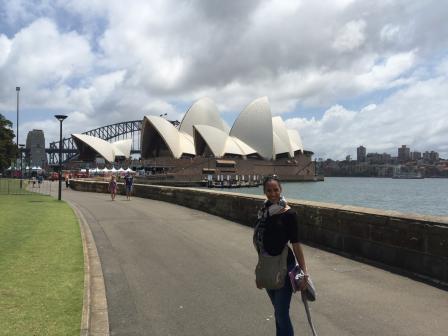Meet EPA Researcher Rachelle Duvall, Ph.D.
EPA Environmental Engineer Dr. Rachelle Duvall evaluates innovative equipment and approaches to measure air pollutants in the ambient air and near pollution sources. EPA Environmental Engineer Dr. Rachelle Duvall
EPA Environmental Engineer Dr. Rachelle Duvall
Tell us about your background.
I have a B.S. in Chemical Engineering from the University of Rochester. I decided during college that I was more interested in environmental topics (specifically air pollution) and decided to pursue graduate studies in Environmental Engineering. I received an M.S. and Ph.D. in Civil & Environmental Engineering from the University of Wisconsin-Madison. I started at EPA in Research Triangle Park (NC) as a postdoc and was eventually hired into a permanent position.
How does your science matter?
My research focuses on measuring air pollutants in the ambient air and near sources (like roadways and industrial facilities) using a variety of innovative equipment and approaches. Air pollutants can cause harmful impacts on human health and the environment so knowing the types of pollutants and how much of them are in the environment is important. In my research, I also incorporate citizen science/crowdsourcing methods to better understand air quality and source emissions. EPA’s mission is to protect human health and the environment. The science I conduct matters as it contributes to EPA’s important mission while also engaging the public in collecting data to better understand air quality.
What do you like most about the research that you do?
I like that there’s a variety of new things that I can explore. Science is always changing and advancing, and it is exciting to be part of that. For example, I have been conducting research on air sensor technologies which are smaller devices that measure a variety of air pollutants. Compared to traditional air monitoring devices, air sensors are lower in cost, easy to use, and are more portable. My sensor research has also allowed me to combine my interests in educational outreach and citizen science. Sensor devices are an excellent tool for teaching and raising community engagement and awareness about air pollution.
If you could have dinner with any scientist, past or present, whom would you choose and what would you ask him/her?
I would have dinner with Stephen Hawking. I find his life story very fascinating and I’m impressed by the huge scientific impact and contributions he’s made. I would ask him about his research, books and what keeps him determined and motivated despite challenges.
If you weren’t a scientist right now, what would you be doing?
I’ve been introduced to the wonderful world of children’s books! Ones that I really like are a series called “Touch the Art” which showcase famous art pieces with components you can touch. I would create something similar focused on science!
When did you first know that you wanted to be a scientist?
I knew I wanted to be a scientist in high school. I always liked math. I specifically liked chemistry but I didn’t really like any of the other sciences. I didn’t know what I could do with those subjects. Every Saturday morning, my older sister and I used to go to a science and technology enrichment program at a local college in New York where we would do science or math experiments in a laboratory. One day, I attended a career panel of engineers and scientists, and I heard a female engineer talking about her career as a “chemical engineer” and thought, “That’s what I want to do!” Chemical engineering seemed like a good fit for me since I loved math and chemistry.
What advice would you give students interested in a career in science?
Taking a variety of science and math classes is very important and having hands-on scientific experience through internships or volunteer activities. My biggest piece of advice is to maintain your communication skills in particular writing! When I was in middle school and high school, I HATED to write. My dad would make me and my sister do writing assignments and math sheets every day during summer breaks…and really any school breaks. Naturally I did the math assignments no problem, but dragged my feet on the writing. Communication is VERY important as a scientist (and thanks dad for those ‘awful’ writing assignments!). Many students are attracted to science careers because they don’t like to write. However, to advance as a scientist you have to tell people about your research, whether it’s through writing a paper or giving a presentation. Make sure you take classes that encourage you to write (English, History, or others) and practice your public speaking skills.
 Dr. Rachelle Duvall completed a three-month detail as a Science Fellow at the U.S. Embassy in Canberra, Australia. She also spent time in Sydney and Melbourne supporting the U.S. Consulate offices.What do you think is our biggest scientific challenge in the next 20/50/100 years?
Dr. Rachelle Duvall completed a three-month detail as a Science Fellow at the U.S. Embassy in Canberra, Australia. She also spent time in Sydney and Melbourne supporting the U.S. Consulate offices.What do you think is our biggest scientific challenge in the next 20/50/100 years?
Global climate change will continue to be a big scientific challenge that will span many years. While there’s a general scientific consensus that climate change is occurring, there’s still a fair amount of skeptics. While at EPA, I had an opportunity to complete a three-month detail as a Science Fellow at the U.S. Embassy in Canberra, Australia, where I was helping advance climate change outreach. Working in Australia reminded me that every country has different approaches to reduce greenhouse gases and every country is experiencing adverse impacts of climate change on different ways. During my short time in “Oz”, I observed a number of climate change impacts such as the unseasonably warm temperatures at the start of spring, early bush fire (wildfire) warnings, drought conditions, the destruction of coral at the Great Barrier Reef, and much more. Globally, there is still a significant dependence on non-renewable energy sources like fossil fuels. How can we continue to move towards using more renewable energy sources while also balancing economic, social and/or cultural needs? It’s certainly challenging.
If you could have any superpower, what would you choose?
I like to have options so I would want the power to absorb everyone else’s superpowers!
Editor's Note: The opinions expressed herein are those of the researcher alone. EPA does not endorse the opinions or positions expressed.
